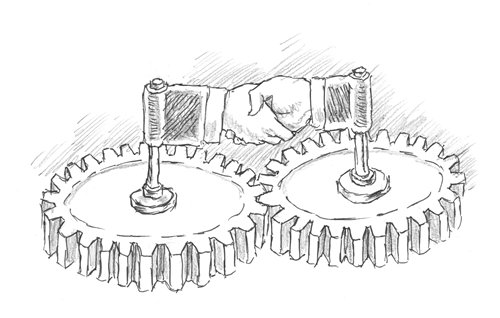COMMENTS / EXPERT ASSESSMENT
Xi-Trump set to promote reciprocal relations

Illustration: Peter C. Espina/GT
It is widely expected that the upcoming meeting between Chinese President Xi Jinping and US President Donald Trump will redefine the Sino-US relationship. At present, there is a competitive relationship in certain industries, and how to deal with the industrial competition is a common problem faced by the two economies.When talking about the Sino-US industrial competition and trade friction, one cannot ignore the photovoltaic (PV) industry. Since 2011, China's PV products have faced frequent trade friction with the US. The US Department of Commerce in 2011 initiated anti-dumping and countervailing investigations into solar panels imported from China. In 2012, it ruled that it would impose anti-dumping duties on Chinese solar cells, ranging from 18.32 percent to 249.96 percent, and countervailing duties of 14.78 percent to 15.97 percent. In 2014, the US initiated another anti-dumping and countervailing probes into Chinese solar products, escalating trade conflicts between the two countries in the solar sector. In the face of the high anti-dumping and countervailing duties, many Chinese PV companies were forced to reduce their production scale at the start, but after years of adjustment and rearrangement, some changes have been seen in these Chinese solar producers.
To deal with the trade barrier set by the US, some Chinese PV companies chose to build production bases in emerging markets such as Vietnam, before using their price and technology advantages to export solar products from emerging markets to Western countries. Over the past three years, Trina Solar has built four new production bases in Malaysia, Thailand, Vietnam and the Netherlands by means of mergers and acquisitions as well as investment. In March 2016, Trina Solar announced the official launch of operations at its manufacturing facility in Thailand, with an annualized production capacity of 700 megawatt PV cells and 500 megawatt PV modules, offering great support to the company's sales in the US and European markets.
The US' trade protection forced Chinese PV companies to accelerate the pace of establishing overseas production bases. Although the US has implemented trade protection measures on the Chinese PV sector, it has not actually affected the PV companies' competitiveness. Wherever Chinese PV companies produce, they can always do better than their US and European competitors. The new overseas production bases set up by Chinese companies are fully in accordance with the rules of international trade and even without subsidies from the local governments their PV products remain competitive in the European and US markets. This proves that Chinese PV companies can win the global market not with government subsidies but with their core competitiveness.
Chinese PV companies do not fear the US' trade protection measures. The PV industry has huge development potential in Southeast Asia, Africa and Latin America, and Chinese companies are further exploring these emerging markets for a diversified market layout.
Moreover, instead of benefiting local industries, trade frictions have brought losses to countries that initiated trade protection measures. Europe started to raise trade barriers in the solar sector in 2012. Yet, after nearly five years of trade disputes with China, the PV industry in Europe failed to see any major improvement, with their market shares even declining. And so is the situation in the US.
No one wants to see trade confrontations. China and the US should deal with industrial competition with an open view and build a mechanism for competition and cooperation. In fact, healthy competition is conducive to facilitating the upgrading of the two countries' industries, which will be a win-win result. Hopefully, at the meeting Xi and Trump can push their countries to adopt a more positive attitude toward bilateral industry and trade cooperation.
There is a huge space for the upgrading of the Sino-US cooperation. In recent years, China's private companies have been getting stronger, accompanied with surging overseas investment. Meanwhile, the global market is undergoing profound changes, with the anti-globalization and trade protectionism on the rise. Chinese companies have to accept harsh judgments in overseas markets and their overseas investments have suffered a series of unfair treatment.
China's private firms are not weak and they don't need special protection. Many industries such as the PV sector already have global leading edge. A just and equal environment, with no interference from non-market factors, is what they need the most when going out.
If China and the US can establish a reciprocal political relationship, then misunderstandings from poor communication can be reduced, which will positively impact Sino-US trade and business development.
The article was compiled based on an interview with Trina Solar Chairman and CEO Gao Jifan. bizopinion@globaltimes.com.cn

